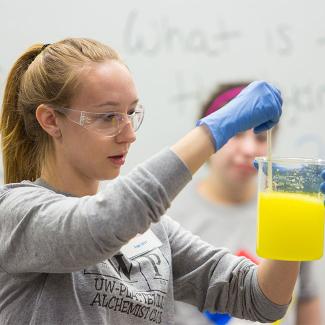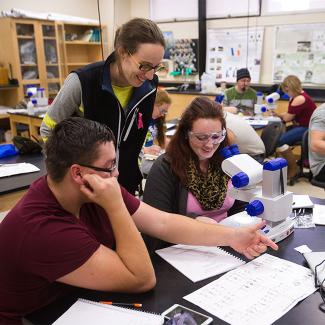What you'll learn in Pre-Pharmacy studies at UW-Platteville
The two-year Pre-Pharmacy program with the University of Wisconsin-Platteville’s Department of Chemistry serves students from any science major interested in pursuing a career as a pharmacist. In your pre-pharmacy courses, you will learn about chemistry, anatomy and physiology, and more, while preparing for the high-level coursework of pharmacy school.
Outside the classroom, you can build on your experience through student clubs and organizations, or undergraduate research to help you build a competitive resume for your advanced schooling application. Plus, we offer a wide variety of campus support programs like STEM Living Learning Communities, mentoring, and others that allow you to create a student experience unique to you and your goals.
Once you complete the pre-pharmacy degree program, you’ll be poised to complete the Pharmacy College Admissions Test (PCAT) and be accepted by a school of pharmacy. Following graduation, completion of a one-year internship, and passage of the state board examination, you’ll be licensed to practice as a pharmacist.
Careers in Pharmacy
Most students who choose pre-pharmacy programs and then pursue pharmacy degrees work as pharmacists. Pharmacists control and dispense medication as prescribed by physicians, counsel medical professionals and patients on potential side effects and drug interactions, provide immunizations and vaccinations, and supervise the work of interns and pharmacy technicians.
Working as a general licensed pharmacist is not the only career path available to you. Pre-pharmacy schools prepare students who want to specialize in a particular area of healthcare as well as for a range of other careers in this field. Some of the roles you might consider include:
- Ambulatory care pharmacist
- Biomedical researcher
- Cardiology pharmacist
- Chief clinical officer
- Clinical inspection pharmacist
- Community pharmacist
- Drug advertising reviewer
- Drug pricing specialist
- Drug safety advocate
- Education and training pharmacist
- Emergency medical pharmacist
- Geriatric pharmacist
- Hospital pharmacist
- Immunization pharmacist
- Industry pharmacist
- Infectious disease pharmacist
- Managed care pharmacist
- Medical science liaison
- Medicinal chemist
- Nuclear medicine pharmacist
- Oncology pharmacist
- Outpatient pharmacist
- Pain management specialist
- Pediatric pharmacist
- Pharmaceutical sales representative
- Pharmacology researcher
- Pharmacy programs coordinator
- Poison control pharmacist
- Psychiatric pharmacist
- Public health service pharmacist
- Surgical care pharmacist
- Toxicology pharmacist
- Veterinary pharmacist
Pharmacy professionals primarily work in pharmacies and drug stores, although are also needed in hospitals and clinical settings, as well as ambulatory healthcare settings. Whether you choose to specialize in a particular area as a practicing pharmacist or opt for a nonpracticing role, you will rely on the knowledge, analytical, communication, and problem-solving skills learned in your pre-pharmacy coursework.

Discover by doing
As a pre-pharmacy major at UW-Platteville, you will learn both in the classroom and through experiential opportunities where you can apply your knowledge firsthand. Choose from research projects, internships, and university events designed to help prepare students for their futures after college graduation.






